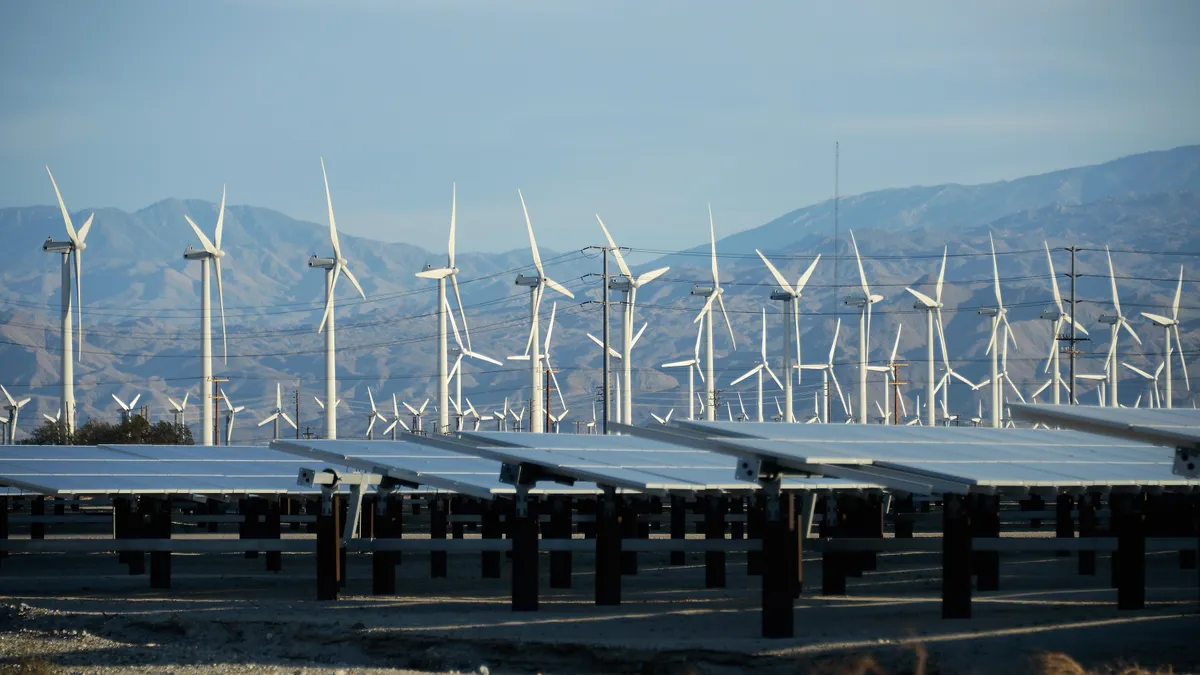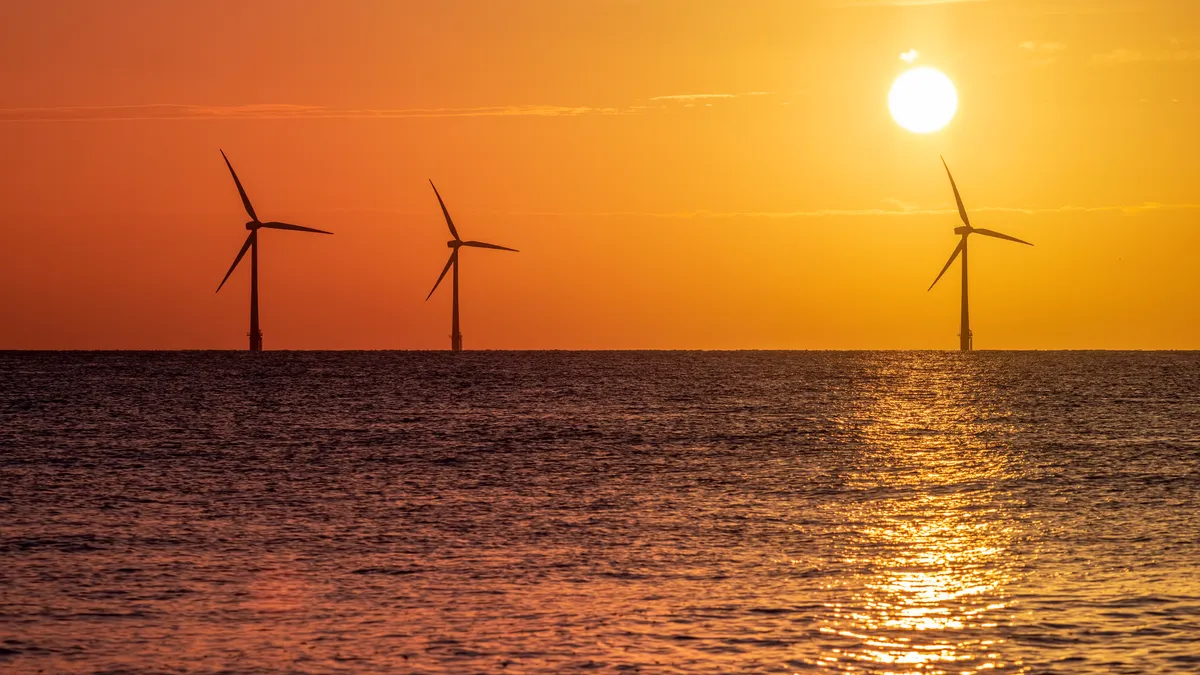Clean energy stakeholders see a window in the next few months for Congress to pass broad clean energy tax breaks amid high energy prices and an ever-narrowing legislative calendar.
Failing to approve the proposed tax breaks will likely result in "delayed and canceled projects and a slowing, or even reversal, of onshoring our domestic supply chains," Leah Rubin Shen, Advanced Energy Economy's federal policy director, said via email.
"Those are the real-world implications if this doesn’t get approved — fewer wind and solar projects built, slowed efforts at decarbonizing our grid and transportation system, all while China continues to dominate the supply of technologies, like solar panels and lithium-ion batteries, critical to building a clean energy future," she continued.
The Senate has been focusing recently on the nomination of Ketanji Brown Jackson to be an associate justice on the U.S. Supreme Court, along with several other matters. Now that Jackson has been confirmed, renewable energy advocates are hoping to see movement this month on a budget reconciliation bill and its clean energy tax breaks, which include new credits for storage and transmission along with updated incentives for wind and solar, among other energy measures.
But is such an expectation realistic, Gregory Wetstone, president and CEO of the American Council on Renewable Energy, asked a Senate staffer and a House staffer on a panel Wetstone moderated at ACORE's March 24 policy forum. In addition, how do various cross-pressures — such as the war in Ukraine spurring increased attention to natural gas and Senate Energy and Natural Resources Committee Chairman Joe Manchin, D-W. Va., signaling support for an all-of-the-above energy strategy — affect the prospects for getting the tax breaks enacted?
"The events in Europe are ... spurring additional desire to move on the energy package," said Bobby Andres, a senior policy adviser for Chairman Ron Wyden, D-Ore., on the Senate Finance Committee. The budget reconciliation package that was put together last fall and into December by the House Ways and Means Committee and the Senate Finance Committee was designed to tackle climate issues, but those design choices can also help address energy costs and spur energy development, Andres noted.
"There are plenty of issues, we still have to resolve with the package writ large," Andres said.
"But I think we're still extremely optimistic about the path forward for passing this package, and in preserving the bulk of what we had in December," he said. "In terms of timing ... Congress can move, especially the Senate, can move, as quickly or slowly as there is political will," he added.
"The opportune time to take action is likely in the next month or two," he said.
Sen. Wyden. who spoke during a separate session at the ACORE forum via a video link from Capitol Hill, also expressed a note of optimism.
"After consideration of the Supreme Court nominee ... there's an April break. I think you're going to see a lot of senators saying, 'alright, I've been home, what's next?' And they're going to hear from folks at home, 'do something about prescription drugs, something about clean energy, ensure that everybody is paying their fair share in terms of taxes. That's essentially what I said is the starting point of the next round of the debate," Wyden told the forum.
But the shape and legislative path of any potential slimmed-down version of the broader reconciliation package, also known as the Build Back Better bill, remain uncertain.
Manchin's concerns about various aspects of the original bill, particularly its social spending provisions, helped prevent its passage last year and there are no formal discussions occurring between him and his colleagues on the matter, the senator has said.
In addition, Sen. Kyrsten Sinema, D-Ariz., who also opposed the original bill, "has told donors a path to revival is unlikely," Axios reported April 5.
While Manchin's office did not have any specifics to provide regarding the senator's views on clean energy tax breaks, the senator's communications director, Sam Runyon, said the following:
“Senator Manchin is always willing to engage in discussions about the best way to move our country forward. He remains seriously concerned about the financial status of our country and believes fighting inflation by restoring fairness to our tax system and paying down our national debt must be our first priority. He has made clear that we can protect energy independence and respond to climate change at the same time," Runyon said in an email.
"We must maintain energy independence by advancing an all-of-the-above energy policy to continue producing energy cleaner than anywhere else in the world,” he continued.
Doubling down
From the Biden administration's perspective, the president won't abandon the Build Back Better bill with one try and will work with Congress every step of the way, White House National Climate Advisor Gina McCarthy said during the ACORE policy forum.
"Is the president going to worry so much about Ukraine that he can't focus on domestic [issues]? No. He is going to move forward and he's going to double down. He'll talk to Senator Manchin and anybody else, as will all of us, ... about why for their states, their constituents, their families, they need to make this happen," she said.
While administration officials stress their willingness to talk with Manchin and other lawmakers, clean energy groups are looking to the next few months as an opportunity to pass an updated budget reconciliation package.
"It can take one or two months to move a significant package through both chambers. So, realistically, if we’re talking about passage before August, negotiations need to begin in earnest in April," AEE’s Shen said.
"The August recess effectively puts a hard stop on the legislative process, so if a reconciliation deal is coming together, June and July look like the most likely timeline for passage," Shen added.
But the reconciliation bill "is also expected to look quite different from the House-passed version [last year], with many other priorities for legislators left out, which could lead to additional challenges in moving [it] forward," Shen continued.
Challenges ahead
Even beyond the critical task of getting Sen. Manchin on board, there are a number of other challenges to advancing an updated budget reconciliation bill that includes the clean energy tax provisions.
"The slight challenge I think we face right now, particularly in the House with many members facing potentially tough re-elections and tough districts going forward, is the immediate [energy] price spike that they're facing and wanting to offer shorter-term solutions," Jon Bosworth, legislative director for Rep. Earl Blumenauer, D-Ore., said at the ACORE forum.
"We've seen a variety of these proposals aired out either in legislative text or in the press, from new ideas of more drilling or suspension of certain excise taxes or other ways, just to bring down the prices in the immediate [term] and that I think is something that many members at this point are focusing on to try to show back home that they're trying to do something about it now," Bosworth said.
"Just as a practical matter, the bandwidth that members and staff have to focus on issues not related to the fire or the crisis [of the moment]...is very challenging," he added.
Andres noted several other issues that could pull Congress's attention, including additional aid packages related to the war in Ukraine, Covid funding as well as a competition bill with semiconductor investment and other research funding.
Retroactivity, extenders
Beyond the issue of timing for legislative action, two key questions surrounding the clean energy tax incentives are whether they would be retroactive to the beginning of 2022 and at what point, if the incentives do not advance in Congress, does the focus turn to extending the existing clean energy tax breaks as has been done in the past.
Making the credits retroactive, Wetstone said, is "a good signal to send now in order to do what we can to promote investment in the meanwhile, and to reinforce the strongest growth."
Andres and Bosworth both expect the tax breaks will be retroactive to Jan. 1.
Almost all of the clean energy tax breaks in the Build Back Better bill were tied to a Jan. 1, 2022, effective date, Andres said.
"When it comes to the general provisions of the extension of the [Production Tax Credit], the [Investment Tax Credit] and some of the changes in policy, I think our inclination is to stick with that 1/1/22 date. Because unlike a lot of other tax provisions, these aren't necessarily tied directly to a taxable year. They've long been tied to calendar years. And so that partial retroactivity I think we're fairly comfortable with and [it's]... something that Congress has done many, many, many times in the past," Andres continued.
But Andres and Bosworth both agreed that the longer things drag on, the more challenging it gets to make the credits retroactive.
"For some of the expansionary policies or new provisions, it gets a lot harder for us to tell the IRS that they've got to process a new type of property, a new type of credit, if we don't enact it until two-thirds of the way through the year, and they've got to look at projects" that are already underway, Andres said.
As for extenders, "do we start thinking about [them] now or keep our eye on the bigger package?" Wetstone asked.
"There are still several legislative months ahead of us here. And a long-term reconciliation type package is still very much on the table," Katherine Gensler, vice president of government affairs and marketing for renewable energy company Arevon, said at the ACORE forum.
"Most critically, from my perspective, is making sure that there is a storage ITC included in any year-end package ... You don't want the shift to an extenders mindset to be looking at only pieces of the tax code that currently exist today. We would be missing a huge opportunity to make sure that the storage that is necessary to gird the grid and to really provide additional pathways for renewable energy deployment" is available, she said.
Will Conkling, head of data center energy supply for the Americas and Europe, Middle East and Africa for Google, said the uncertainty in the renewable energy market is having real impacts. It's critically important to make any legislative package "as long term and stable of a signal as possible" as opposed to having temporary extenders, he said.
And there's no guarantee that tax credits would be extended if the reconciliation bill fails to pass this year.
"The ability to reach deals on extenders, especially on energy provisions [has] gotten harder and harder and harder," Andres said.
"So to the extent you want something that is providing that 10-year plus certainty, that is expanding the net to include transmission and storage bringing in things like direct pay ... all that kind of stuff, reconciliation is the pathway that we need to go down," he added.






















